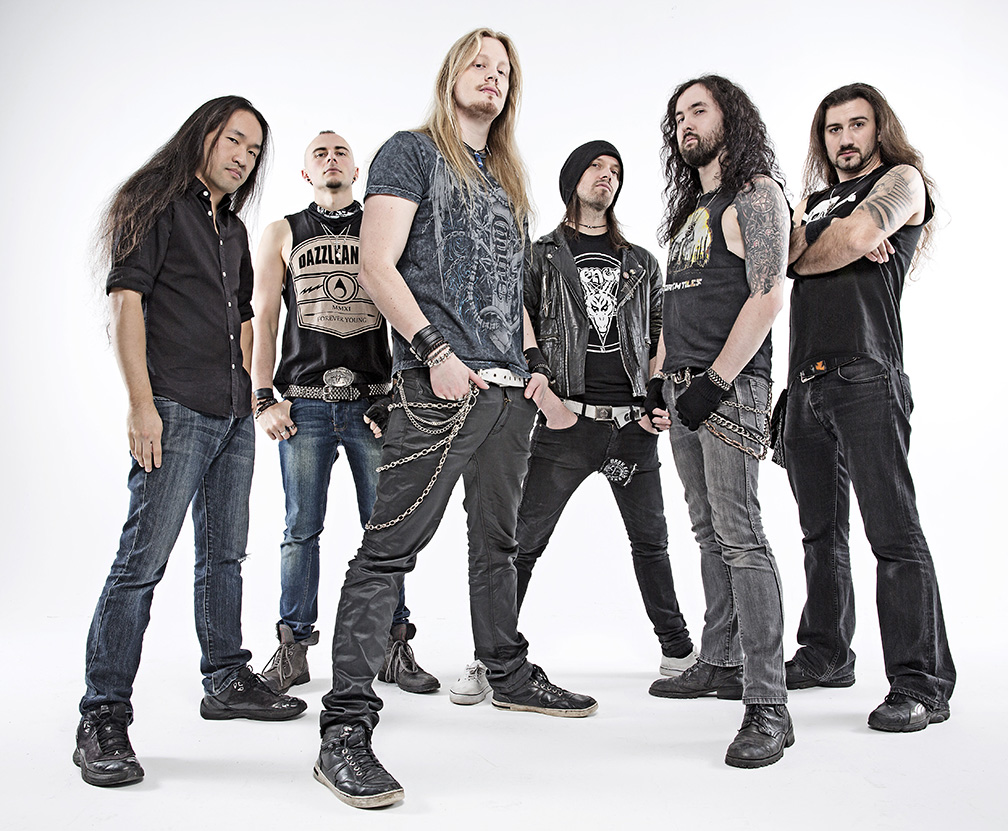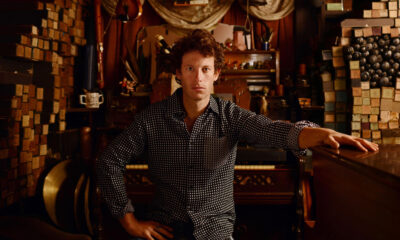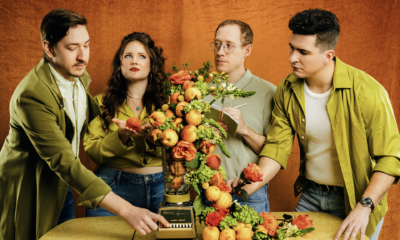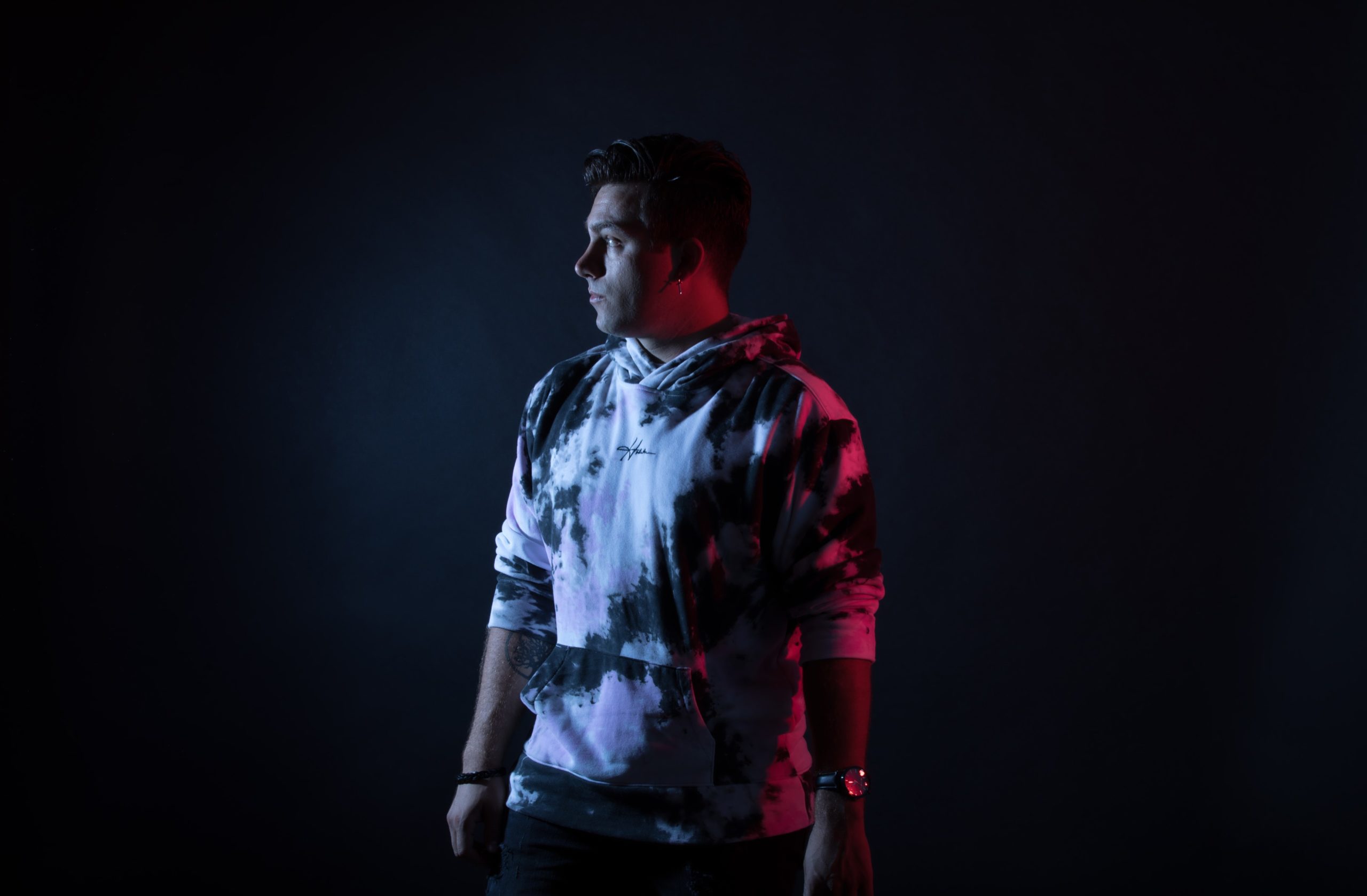Interviews
Herman Li and Sam Totman Interview – Dragonforce
Interview by Mike Bax
If power metal was a balloon, and you turned it inside out and stuffed it full of the best elements of thrash metal, über guitar riffs, soulful (man-style) harmonizing and big meaty choruses, then you’d basically have Dragonforce. Known the world over as ‘that band with the hardest song to play on that video game’ Dragonforce is so far beyond that stigma it’s almost staggering. What is of most importance is that the band is about to drop their finest album EVER upon an unsuspecting public. Maximum Overload, an album comprised of ten slightly shorter and more focused compositions, should be the album that gets the planet to take notice.
I have not stopped playing Maximum Overload since it graced my desktop. I’m playing it now as I type this. It’s everything I’d ever want from Dragonforce and more. To me, Dragonforce always commended respect for the prowess of their playing, and their energetic and often comedic stage presence. Their albums always felt like they were lacking something to me. With Maximum Overload, there isn’t anything missing at all. This album comes on like a freight train, and never stops roiling through. Every song it tip top. There is a wonderful Johnny Cash cover (Ring Of Fire) to end the album, and if you buy the deluxe edition five bonus songs that you REALLY should own, as they are all on par with the main album.
Maximum Overload may not be the best album of the year. It may not even make anyone’s top ten lists. But it should. This is pure unadulterated Dragonforce, with everything turned up to eleven. \m/
Both Herman Li and Sam Totman were good enough to kill 25 minutes of their time chatting with me from the UK about Guitar Hero, finding inspiration, cover versions and internet haters last week. That full dialogue is below.
Mike: I’m super stoked for Dragonforce. You’ve got a pretty awesome album sitting on the wing right now.
Herman: Thanks for checking it out.
Mike: I don’t want to discount anything that you have done before because Dragonforce is awesome, but this album sounds more like an ALBUM. It sounds more concise somehow.
Herman: I think it’s just us as a band evolving. In the early albums, every song was fast and that was what we needed to do in order to make OUR sound, to make our identity. Now that we have that identity, I think it enabled us to try out different things. On this album I think it’s (Dragonforce’s sound) more diverse. Somehow it’s a little bit easier to get into than some of our previous albums.
Sam: And every single song was really long. I get what you mean. I guess in the traditional sense it’s more like that. We’ve really just evolved. I guess this album is a bit more varied.
Mike: When I got the download link from Metal Blade I saw that it was 10 songs and wondered if it was a double album. Your songs are usually 8 or 9 minutes long.
Sam: Yeah, exactly. They are all 5 minutes long on this album, even less on a few of them actually. But that wasn’t really about people thinking, ‘Oh, they’ve slowed it down or sold out’. We just play what we like. There’s no sort of big thought process behind it. It’s more like, ‘this is what we want to play right now’.
Herman: They (our audience) will still get a fair amount of music on the album. There are just more songs. The songs got shorter but there are more songs. It’s the same amount of music. They get more choruses instead of a thousand guitar solos.
Mike: Did you guys go into this album with any parapets? Did you have a kind of a scheme? Did you want to try and change things? Were you looking to make some of your songs shorter?
Sam: Not so much the length. The only thing we really thought of before and actually planned before doing the album (which we actually did before the last two) is we said, ‘let’s have four songs at this speed, one at that speed and one at this speed’. That was the only real rough planning we did. The length was just the way things came. In the past, when I’d write a song I would say that a lot of our earlier songs had a similar formula. I’d be like, ‘it has to have this to start in, then it has to do that, and then it has to do this, this, this and this’. And then by the time you got to the end it was like 8 minutes long. And now I just find that with the instrumental sections, I’d prefer to have more songs than the longer instrumental sections. That’s just personal taste, I guess.
Mike: I don’t want to steer some of your fan base into thinking that this is a really different sounding Dragonforce album. It’s not. It’s still really heavy on the riffs, it’s very concise, it’s very technical, it’s just got a little bit more exploration happening on it, and I really like it because of that.
Herman: Oh, awesome. We definitely injected different stuff into it. There’s more riffs. There’s a thrash element and some instrumental sections that are slightly different. A song like ‘Symphony Of The Night’ which is a bit more neo-classical than some of the other ones that we used to do. In a way, after doing so many songs, if you don’t do something different and you don’t add more musical elements to things, you can get stuck playing your solos the same way.
Sam: We don’t want to take anything away that we thought was cool in the past. So we always make sure we have a big catchy chorus. We might try doing a slower song, but it’s still going to have a big chorus, which to me is the basis of a good song. Everything else is extra stuff. I don’t think any of our old fans are going to be disappointed at all. I really believe that. There may be some people that listened to us a long time ago and maybe stopped listening to us, maybe they will get back into it with Maximum Overload.
Mike: This is your first album with Metal Blade. You’d been with Roadrunner for a little while. Do you feel like you’ve found a new home with them? Has it been good so far?
Herman: Yeah, they have been really good so far. We had quite a few choices on this album. We did go down to the wire on it. Everyone that we were negotiating with in the beginning all had really good plans and were enthusiastic. But Metal Blade had that edge. They definitely loved us, and they loved the music. They understand Dragonforce really well and they knew what to do with it. With their experience, we thought they would be the best choice for us to release this album in North America.
Mike: I follow your Facebook and your Twitter feeds. I’m a fan before being a pseudo journalist. It was curious to me that I was reading about people getting a bit upset about ‘The Game’, the first song that you released online (laughter) and it was like the first ten comments after the song went up were like: ‘what happened? There’s a big change here!’ And they weren’t real happy about it. That surprised me.
Sam: It surprised us, too. It’s a faster song. But apart from that, it’s not really different. It’s got the riffs that are slightly more obvious, but we’ve always had these thrash riffs in the background. There’s usually some lead guitar on the top, maybe. I don’t really consider that song a huge change anyway.
Herman: I was reading some of these comments saying that we’d gone metal-core, and I was thinking: ‘where is the metal-core coming from?’ Just because we did some riffs some people were saying the solo is horrible and there’s the comments that say that the song sounds exactly like all of the other Dragonforce songs. (chuckles)
Sam: Yeah, you can’t really buy into it. Obviously, I read the stuff. I like to know what people think. But I don’t see why people think this is so different. ‘Cry Thunder’ (off of the Power Within) was definitely different to the old Dragonforce material. This was just a bit faster. And those guys eventually got it.
Mike: It’s one of the tracks that Matt (Heafy) is on, right? Some backing vocals? Maybe that’s it?
Sam: Yeah, I guess. We don’t really care too much. It’s nice if people like it, but it’s interesting to see. We’re playing it because we like it. That’s the first thing. It’s kind of interesting to think we come from one generation, right? Some people that are saying it sounds like metal-core; we don’t even listen to metal-core. We come from a thrash background, death metal. We’re doing riffs. That’s because of our thrash influences when we were young. Some young teenager might think that we are trying to be metal-core.
Herman: Metal-core is trying to be elements of thrash.
Sam: It’s interesting. Everyone is different ages with different backgrounds and that is kind of the way the world is right now.
Mike: It’s interesting to me and it’s not just Dragonforce, it’s the internet. It’s so easy for people to jump on and hate on something and jump the gun and make a comment. There’s no repercussions for it. It’s knee-jerk.
Sam: Exactly. It doesn’t really bother us at all. It’s just interesting more than anything to hear what people are thinking in the world.
Herman: I do remember when Inhuman Rampage came out in January 2006, I was reading the Dragonforce forum and people were just hating the album, saying: ‘this is rubbish’, ‘why are they putting all of these stupid video game noises around the songs’, ‘why are there keyboards?’, “Through The Fire and The Flames – what a crap song” and “My Spirit Will Go On on the second album is a better song than this opener”. And I was just like, ‘ok, what can you do? Right?
Mike: And now, in retrospect, what songs are you playing when you play live, right?
Sam: Exactly. (laughter) Sometimes, even for me, I find that the best albums are not the ones that grab you straight away. Not always, anyway. Some of the best albums do take more than one listen to get into. Not always, but who know. We will see what happens. I like it, anyway. That’s the main thing.
Mike: First and foremost, that’s the most important thing because you guys are going to service Maximum Overload for the next two years, right?
Sam: I quite enjoy listening to it. I stuck it on my headphones on the train the other day and thought it was cool.
Mike: I think I got the advance album link about a week ago, and it’s already my favourite Dragonforce album. And I like the other stuff. There’s some mojo happening on this one.
Sam: That’s cool to hear. Thanks.
Mike: It’s tight. I’m excited for you guys. I think it’s pretty awesome. One of the things that I like about Dragonforce is that with all of these sub-genres like we were touching on earlier, you still have a signature sound and no one else can really touch it. I’m curious, was that a parameter for you two when you started Dragonforce?
Herman: Not when we first started. We weren’t aiming that way. We never had this kind of thing in mind in the beginning. We didn’t even think we were going to be professional band. We just wanted to have some fun, make music we liked to play and go on tour playing it. We could have a normal day job and then just go out and play some music when we could. As the band evolved and took more care in making music, of course we wanted to get better. We wanted to make better albums and be better musicians and try to build on that. Slowly the signature sound evolved. When Fred first joined the band he thought we were a bit too tight when holding the sound. It slowly developed that way.
Sam: I think a lot of it is that we come from such different backgrounds. When I was younger I had some bands with my friends and we were all from the same town and into the same music. We were all into Metallica. We had a death metal band for instance, and we were all into the same bands. We just played songs that sounded like Obituary and Death, because that was all that we listened to. With this band, we all came from different countries, and we all met up in London originally. We are from such different backgrounds that I think that is what helps it become something quite unique. Me and Herman have got quite a different background of guitar. He brought that Steve Vai guitar hero edge into it. I was writing the songs as they are. But if he hadn’t been there, they wouldn’t have that kind of crazy style of guitar playing. If we hadn’t have met Vadim the keyboard player, he was bringing in all of these sort of crazy keyboard ideas. I think that is what has made it unique, in a way.
Mike: Do you find that it gets harder to maintain your originality as you continue to make music.
Herman: Um, I don’t think it’s hard to be original. It’s easy to do what you have already done if you really want to do it. You can’t really let yourself do that, though. You don’t want to sound exactly the same as your other albums.
Sam: Basically at the end of the day, we are just all playing music that we like to play. We are lucky enough to make a living out of it. I’m pretty sure we’d be doing it anyway, regardless. Now that we are on our sixth album, we don’t think, ‘let’s keep all of the great big choruses because that’s what people like.’ We just like them ourselves. And there is no point in playing something that is exactly what you have already done. So we are always trying to do new things but still keeping our signature Dragonforce sound.
Mike: This album marks a few firsts for Dragonforce. It’s the first time that you have done a cover version of another musician’s work and it’s the first time that you have worked with a producer. Can we talk a little bit about those two items?
Herman: Yeah, the producer, Jens Bogren, actually the first time his name came in was when we were about to start mixing the Ultra Beatdown album. We thought we weren’t going to have the time to finish recording it and mixing it in the UK, and we had to go somewhere else because the studio was getting booked up, and Jens Bogren’s name came to mind. It ended up that we were able to kick another band out of the studio and carry on doing Ultra Beatdown there. (laughter) We were the biggest band at that studio, so we got the time. But this time we basically said that we’ve got to challenge ourselves. We can’t just do the same thing again and again because it worked. You can fall behind sometimes if you get into that comfort zone. So by getting a new producer we had to then work differently and under a different kind of schedule and have someone else’s input and that really allowed us to learn a lot from the experience. Jens is a top producer, he is well known for so many great albums.
Sam: Doing the cover, we always said when we first started the band that we didn’t want to play any covers. A lot of bands start off by playing covers because it’s fun or whatever. We already had a bunch of songs when we started out and we just thought doing covers was kind of stupid. Ten years down the line, now that we have never done one, actually DOING one would be original and new for us at this point. So we decided to do one. And we thought if we are going to do one, rather than just playing some cover of some metal band exactly the same (which I think is pretty pointless), let’s get a song that people can enjoy whether they like the original or not. We want them to enjoy the cover song as much as they enjoy the rest of the album. And the Johnny Cash song, when I first heard it I could instantly imagine that song could turn into a Dragonforce song. People might think it’s a bit weird because we are so different. I could hear the melody progressions and the chord progressions and I thought it could definitely work. It came together really fast, actually.
Mike: On paper it sounds a little weird, but when you hear Dragonforce’s version of the song it’s pretty natural.
Sam: Exactly. What I did was took it back from the chorus. The speed of the vocal line and chord progression; that could definitely work as a fast Dragonforce song. It made total sense.
Herman: Can I say something off topic? We are talking about covers, and why we didn’t want to do covers. I’ve got friends that are in bands and they are mostly newer bands. I see a lot of young bands and they are opening for other acts and a lot of them end up doing a cover as their last song. They get the bigger cheers for the cover. I always try to tell my friends who are in bands: “Don’t do a cover. You have to earn it. You want to get the applause from your own music. All of this is not real. People aren’t going to see you because you did Iron Maiden’s ‘Trooper’ or Metallica or something like that. I think that anyone that’s in a band that does a cover for the applause during their set, it’s not worth it.
Mike: I hear that. I can agree. The only time I’ve really seen a cover done that worked well for the band was at a Metallica show. I saw Volbeat play three original songs, and it was like the crowd didn’t get them. And then they dropped a little bit of ‘Master Of Puppets’ into one of their songs and it woke the audience up, and it was like everyone got into them for the rest of their set. It was funny. It was like the band was saying, ‘Hey, we can play music by the band that you are here to see’, and everybody in the room that were there early enough to see Volbeat got into them, and strategically I think it worked to their advantage.
Sam: ok, I mean, we didn’t do it for any kind of strategic reasons or anything. I always thought it was weird. I find that most covers are always exactly the same as the original. That was the thing that always bothered me about them. I just didn’t find it interesting. I’d rather just hear the original. If people enjoy it, there’s nothing wrong with that. If they like it, then they like it. It never did it for me though.
Mike: I’d like to know if Matt Heafy joined you in the studio or not for his songs?
Herman: He did it in Florida. I sent him the files. He basically only had one week off from the tour he was doing. To be honest, we were actually afraid to ask him – he had one week off on his tour and I didn’t want to put this on him. We figured we wouldn’t worry about it and we’d figure something else out. And then Fred went and asked him. And Matt was really happy to do it, he just loves music and doing stuff like that.
Sam: Yeah. It’s cooler if you can have the guest artist actually there with you. More fun, really. But the end result is ultimately the same. Basically he didn’t have the time to come over and join us. That’s one of the good things about this day and age. You can do stuff like that a bit easier I guess.
Mike: It leaves the door open for you and Matt to maybe perform together if you land on a tour together and he can walk out and sing a song with you. That’s pretty exciting.
Sam: I’ve always thought that’s fun, when I see people do that. We’ve toured with them twice, so it’s not impossible. That might happen.
Herman: This could work. If Matt wanted to do a tour together, we could do some martial arts training together as well. (laughter) That’s another factor that will help a tour with us both happen again.
Mike: For fans looking to pick up the new album, are you doing anything exclusive on Maximum Overload? Something off of your website or a pre-order via Metal Blade that some of your fans might be interested to know about?
Herman: We don’t really do any of that ourselves. We let Metal Blade take care of the pre-order stuff. They are doing a bundle with the exclusive t-shirts that you can only get for this album. The shirts won’t be sold on tour – exclusive T shirts for Maximum Overload. So we’ve got that, along with some exclusive vinyl. So if people like vinyl, there is also that online. We spent lot of time getting the artwork worked out for the gatefolds on the album. It should look great.
Mike: What do you feel is the most common misconception about Dragonforce?
Sam: (laughs) That we only got popular because of Guitar Hero. I’m sure there a lot of people out there who think that. But it’s completely not true at all. Before Guitar Hero had even come out we were selling out tours in the US and around the rest of the world. Obviously, having that helped us a lot. But it definitely wasn’t just that at all. We sold a bunch more records because of it, but my theory is – we got a few new fans from it for sure, but we also sold a bunch of records because of it to people who never bought another record of ours.
Herman: We certainly gained a lot of animosity in the metal world.
Sam: Yeah. And I understand that. If I was a 16 year old and my favourite band (like Metallica) and my five year old sister started playing it on some game, it would probably put me off as well. There’s good and bad about the game. That is one thing that we would like everyone to know. We are definitely not just that. We’d been around long before Guitar Hero happened and we will be around long afterwards. Every other band was on guitar Hero as well, but we were the only ones who seemed to catch the shit for it.
Mike: But now, every band would love a song on a video game. It’s ironic that you took flack for it.
Sam: I know. I still find it weird that we got shit for that. Now, every other band that I can think of has been on it.
Herman: I think it was because when we came out in that time and scene, there really hadn’t been any band that had been talked about in the mainstream that would do guitar solos over eight minute long songs. Everyone was still doing a little guitar solo here or there. Most of the stuff was still metal-core. That happening made some people not like us, and we got comments like “that band, they’re crap” or whatever.
Mike: Eh, whatever. I think it’s clever, and maybe that was why. Getting a high profile video game song, THAT is what people want now to licence music. There is no real music video stations around anymore. It’s really hard to get your music out there, especially in the genre of metal. That’s a win – getting onto an aggressive driving game or a first person shooter game – more power to you.
Herman: We never really asked for this thing either. They came to us.
Mike: See, that’s awesome. I have one last one. I’ve already abused a good chunk of your time here. Do you ever play your music slow? Would you ever entertain a watered down or acoustic version of some of your material?
Herman: I’d say never. But we already said that we were never going to use a producer and we were never going to do a cover song and also never going to play a mid tempo song and then we did Cry Thunder. So don’t listen to me. (Laughter)
Sam: Actually, on the last album we did do an acoustic version of a song called ‘Seasons’, but that was kind of a quiet song anyways, so that didn’t really count. I dunno. Personally I’m not really into acoustic versions of songs. I like fast melodic metal, so I’m not going to be any part of it if we do it.
Herman: Yeah, me too. I’m more of an electric guy. I like the acoustic guitar but I don’t think our strengths are there. But maybe we’ll be amazing acoustic players? Who knows?
Sam: Yeah. I think we could definitely do it if we wanted to. I just find that I don’t listen to acoustic music in my spare time, so I don’t really want to play it either.
Herman: An interesting thing. Remember when we made the acoustic version of ‘Seasons’ we all agreed that we definitely liked the electric one better. There is more stuff in it. That’s our ears right now. Maybe when we get older we’ll just want to listen to and play acoustic music.
Sam: Ehm. Probably not.
(Laughter)
****
www.dragonforce.com
www.facebook.com/dragonforce
twitter.com/dragonforcehq
-

 Music3 days ago
Music3 days agoTake That (w/ Olly Murs) Kick Off Four-Night Leeds Stint with Hit-Laden Spectacular [Photos]
-

 Alternative/Rock4 days ago
Alternative/Rock4 days agoThe V13 Fix #010 w/ High on Fire, NOFX, My Dying Bride and more
-

 Hardcore/Punk2 weeks ago
Hardcore/Punk2 weeks agoHastings Beat Punks Kid Kapichi Vent Their Frustrations at Leeds Beckett University [Photos]
-

 Culture2 weeks ago
Culture2 weeks agoCirque Du Soleil OVO Takes Leeds Fans on a Unique, Unforgettable Journey [Photos]
-

 Alternative/Rock1 week ago
Alternative/Rock1 week agoA Rejuvenated Dream State are ‘Still Dreaming’ as They Bounce Into Manchester YES [Photos]
-

 Features3 days ago
Features3 days agoTour Diary: Gen & The Degenerates Party Their Way Across America
-

 Culture6 days ago
Culture6 days agoDan Carter & George Miller Chat Foodinati Live, Heavy Metal Charities and Pre-Gig Meals
-

 Music5 days ago
Music5 days agoReclusive Producer Stumbleine Premieres Beat-Driven New Single “Cinderhaze”













